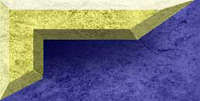|
The Devon Rex, (the Poodle Cat) wags it's tail when happy.
Its short, curly coat and the fact that it sheds very little make this a wonderful breed of cat to have. Large ears, long
thin body and a wonderful personality.
History on the Devon Rex:
This breed is traced back to an alley cat in Buckfastleigh, Devon,
England. In 1960, a woman in England noticed that there was a tomcat living near her home. Needless to say it mated with her
female and produced a curly coated male. Beryl Cox was surpised that the kitten looked just like his father, (curly coated)
and decided to keep him for herself. She named him Kirlee.
Beryl contacted a man named Brian Sterling-webb, a breeder who was
working with the Cornish. It was apparent that Kirlee was not a Cornish Rex. They mated Kirlee and a Cornish queen and produced
nothing but straight-coated kittens. They discovered that Kirlees coat was recessive. Cat Fanciers believe that Kirlees parents
where related since a recessive gene must be present in both parents to affect the physical appearance of the offspring.
This is when they found out that Beryl Cox had discovered a new breed.
A breeding program was set up and Kirlee was bred to several British Shorthair beaus. All of the kittens produced where straight
haired. Both parents must have the Rex Gene. When they bred his daughters back to him (Kirlee) they produced half straight
and half curly. All Devon Rex cats can be traced back to Kirlee.
In 1967, the Governing Council of the Cat Fancy (GCCF) recognized that
the Cornish and Devon Rex were two separate breeds and allowed them to compete independently. The Cat Fancy Association (CFA)
established the Cornish Rex ans distinct from the Devon Rex in 1979. The CFA turned out to be the most difficult association
to convince of the Devons originality. For a number of years, fanciers struggled to persuade the CFA to separate the Devon
and the Cornish. In 1983, the CFA recognized the Devon for Championship in its own right.
Through the years the Devons have been breed with British Shorthairs,
American Shorthairs, and Burmese. This provides new bloodlines while keeping the traits for which the Devon Rex is celebrated.
The Devon is just behind in Popularity with the Cornish in the show
ring. They are ranked 14th in popularity in the United States. In shorthaired they are ranked 10th according
to the CFAs 1999 registration totals.
Because they rarely shed and have fine fur, Rex make ideal pets for
people who suffer from allergies. For those same reasons, they must be protected from extreme heat and cold. Their normal
body temperature is a degree higher than other breeds, making them warm to touch. This also gives them higher metabolism and
correspondingly larger appetite.
|

